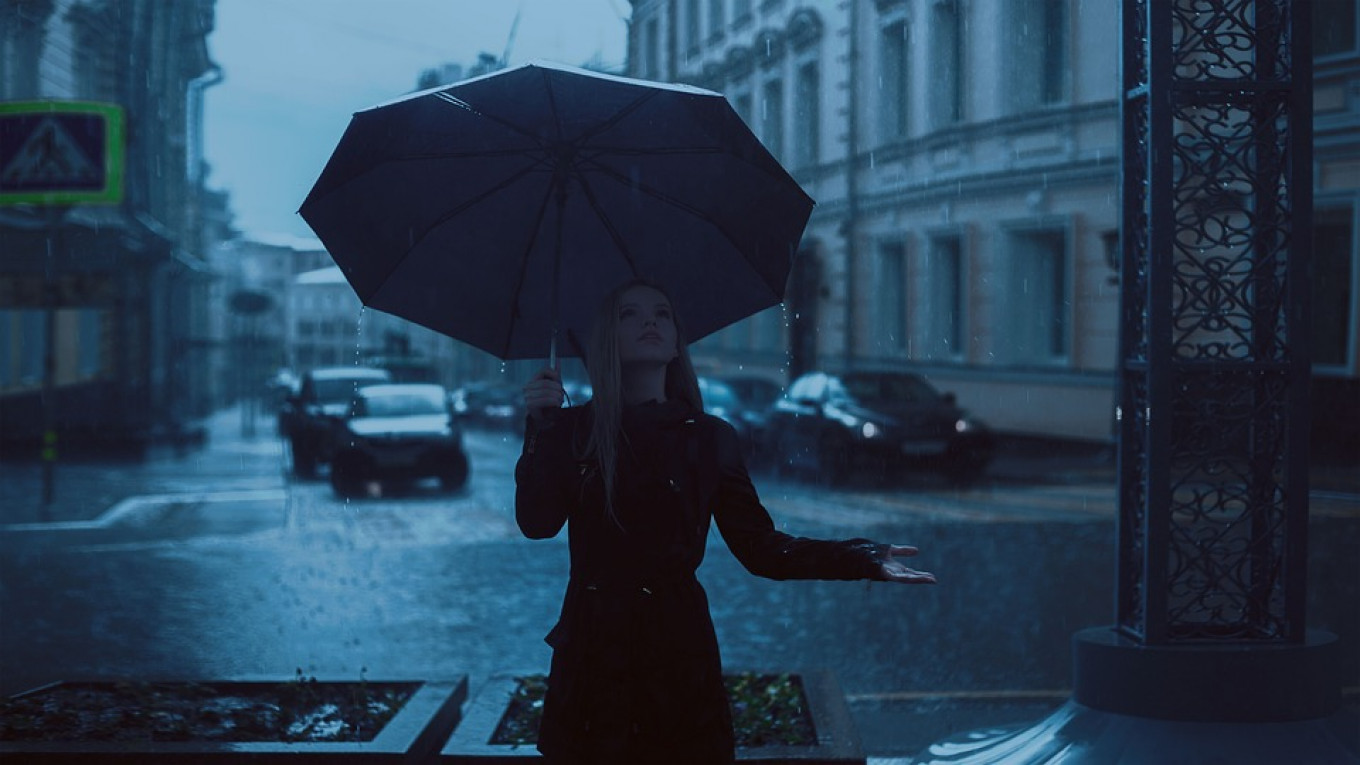
Ливень: downpour
It started out with a couple of drops. На голову капнуло. Это что, дождь что ли собирается? (A few drops fell on my head. Gee — is it going to rain?) Then there were more than a few drops. You begin to remember poems and songs: А на улице капает дождь, В подоконник упрямо стучит… (Rain is falling outside, Knock-knock-knocking on the window sill…).
But still, sometimes it looks like we’re in for a big storm and then the rain passes us by. A neighbor came out of his dacha, held his hand out, and said: Накрапывает дождик (It’s sprinkling.) Накрапывать or крапать (spit, sprinkle) are nicely expressive words to describe those first splatters of rain. As a writer explained: Начинают крапать первые капли. Народное слово “крапать” хорошо передает возникновение дождя, когда еще редкие капли оставляют темные крапинки на пыльных дорогах и крышах (The first drops of rain splattered down. The colloquial word for this (крапать) conveys nicely the first appearance of rain, when the still infrequent drops leave dark spots (крапинки) on the dusty roads and roofs.)
Then it began to drizzle — very peculiar fine rain that could be mistaken for moisture in the air: Асфальт перед домом на глазах темнел ― моросил мелкий дождь (The asphalt in front of the house turned dark as I watched — there was a light drizzle.) Drizzle can be warm or cold: К вечеру моросил тёплый дождь (Toward evening a fine warm rain came down.) Моросит холодный дождь (It’s drizzling cold rain.) When there is a strong wind from the north, the cold stuff — моросящий дождь (drizzle) — can hit your face like a thousand little needles.
At first we all thought: идёт дождик (A light rain is falling), дождик being a nice diminutive of дождь that implies a gentle rain, something pleasant. And then it just rained: Дождь шёл. (It was raining.) That is neutral — not too hard, not too light. Just your average rainfall.
But by late Sunday night: Шёл сильный дождь (It was raining hard.) In fact, шёл проливной дождь (it was pouring). In fact, it was pouring down constantly everywhere. For this you might use the adjective обложной (steady, widespread). Когда настала пора уходить, пошёл сильный обложной дождь (When it was time to leave, there was a steady, heavy downpour.)
In fact, дождь лил как из ведра (it was raining buckets). Actually, it was a torrential downpour. First we used rather neutral constructions: На улице ливень (It’s really coming down.) Льётся ливнем (It’s a deluge.)
Then we stopped being neutral and got more expressive with the verbs. By the next morning, after a night of steady rain with no sign of it letting up, it felt like we’d been hit with something really bad. Сильный дождь обрушился на Москву (Heavy rains hit Moscow.) Хлынул на нас сильный ливень (We were hit with driving rain.)
The newscasters were fey: В осаде осадков: к чему привел многочасовой ливень в Москве? (Besieged by precipitation: what did the hours-long downpour do to Moscow?) And then grim: Пролились сокрушительные ливни (The rains came crashing down in torrents.) And then really grim: Ливень затопил проезжие части 45 улиц и пять подвалов жилых домов (The torrential rain flooded 45 streets and five apartment house basements.)
But perhaps a lesson was learned? Не пора ли построить ливневую канализацию? (Isn’t it time to put in storm drains?)
High time, I’d say.
Michele A. Berdy is a Moscow-based translator and interpreter, author of “The Russian Word’s Worth,” a collection of her columns
A Message from The Moscow Times:
Dear readers,
We are facing unprecedented challenges. Russia's Prosecutor General's Office has designated The Moscow Times as an "undesirable" organization, criminalizing our work and putting our staff at risk of prosecution. This follows our earlier unjust labeling as a "foreign agent."
These actions are direct attempts to silence independent journalism in Russia. The authorities claim our work "discredits the decisions of the Russian leadership." We see things differently: we strive to provide accurate, unbiased reporting on Russia.
We, the journalists of The Moscow Times, refuse to be silenced. But to continue our work, we need your help.
Your support, no matter how small, makes a world of difference. If you can, please support us monthly starting from just $2. It's quick to set up, and every contribution makes a significant impact.
By supporting The Moscow Times, you're defending open, independent journalism in the face of repression. Thank you for standing with us.
Remind me later.




